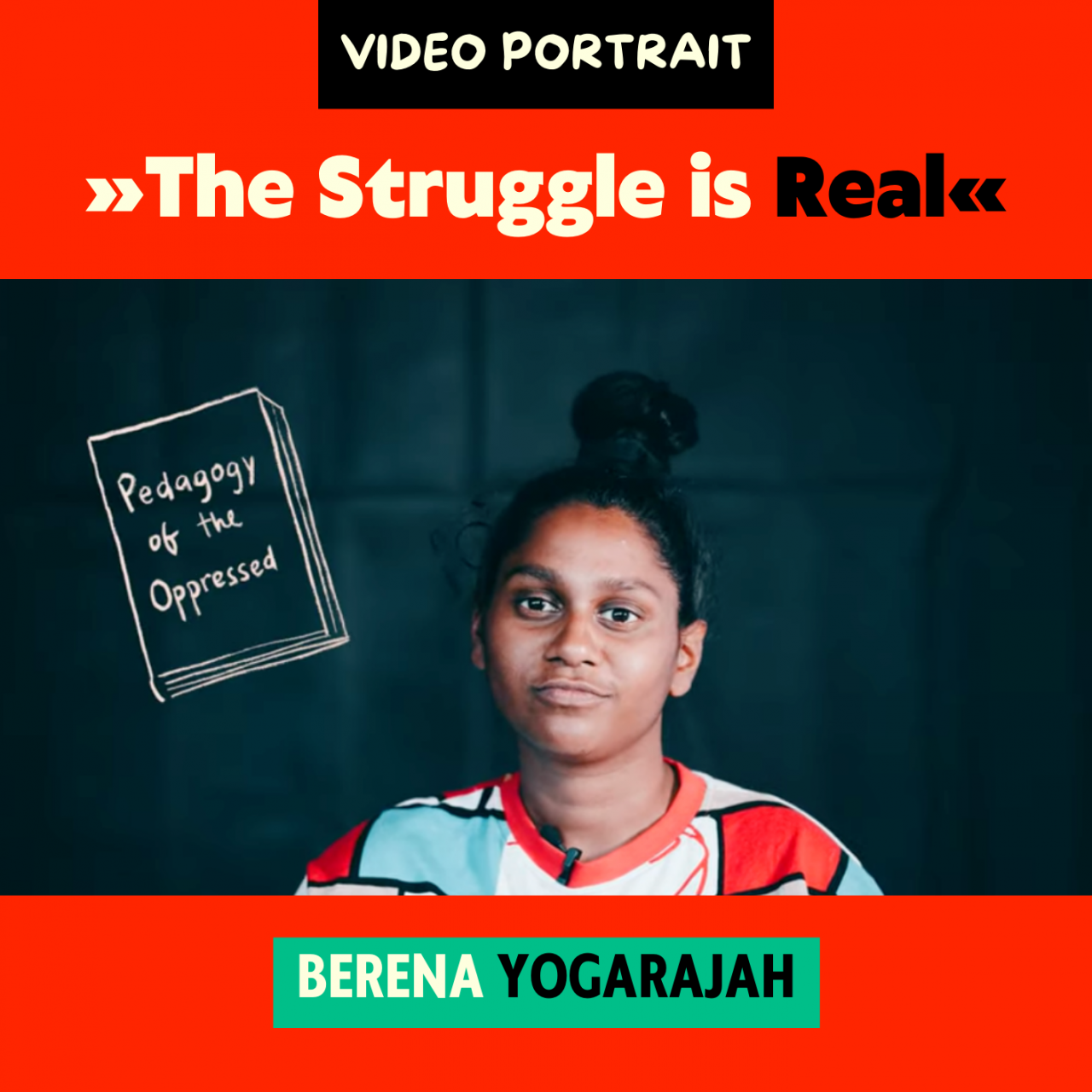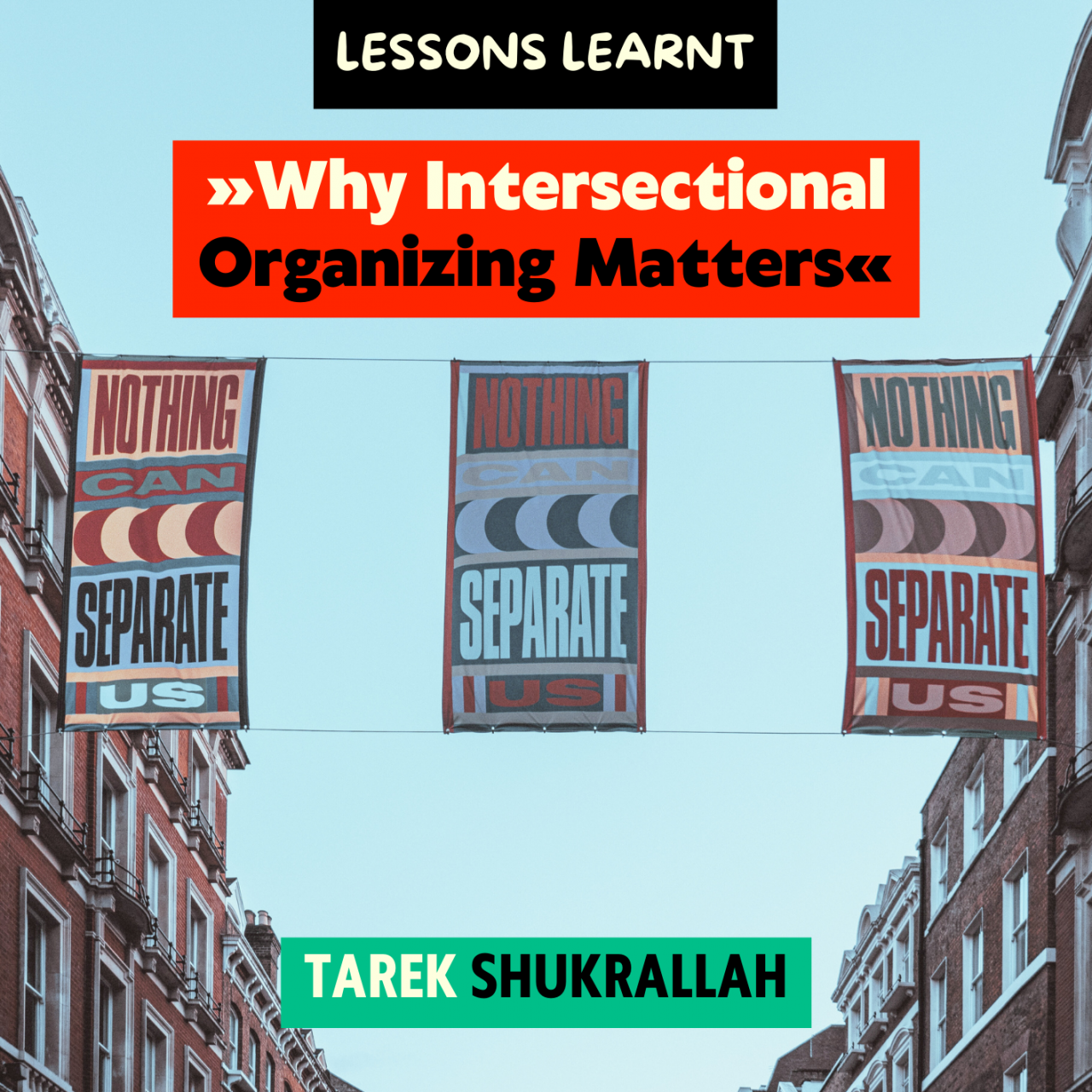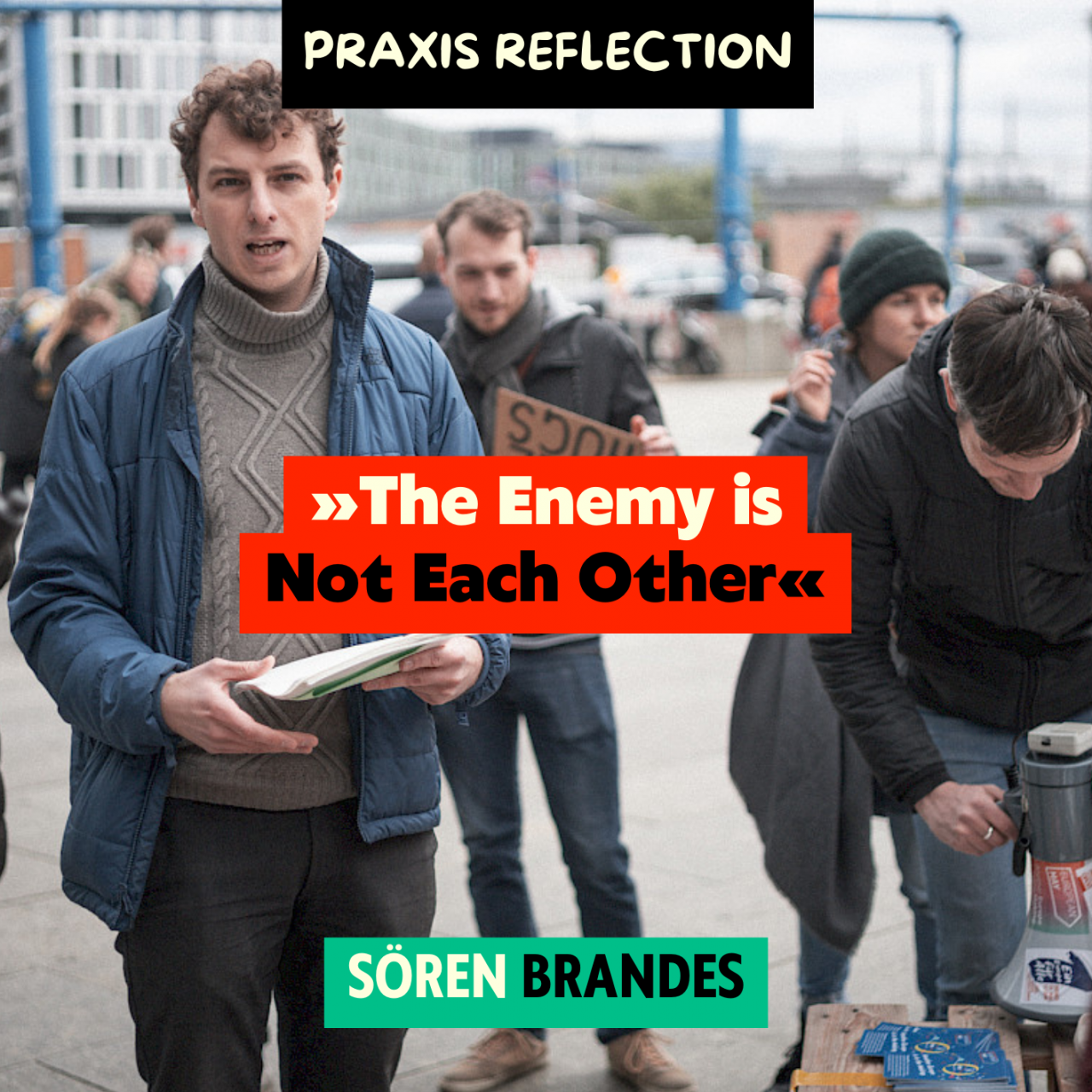How Anti-Racist Struggles Lead to Dead Ends
Realizing that racism is entangled with every level of our everyday life can be overwhelming. It can feed mistrust and suspiciousness: Are the others really playing in my team? Are they really my allies – in opposition to racism? Do they have a deep understanding of what racism is so that they do not only have good intentions while they are actually making things even worse? Understanding our own past and the traces of racism, understanding the violence and brutality of racism might lead to miserable and pessimistic ideas of what could be. Knowing racism is basically everywhere might make it even more threatening, feelings of fear might arise just as the need to feel safe. So, the rising awareness sometimes leads to higher vulnerability instead of more fierceness. We eventually become small frightened children who want to feel safe and trust that they will be taken care of.
What is the political effect of this? Building alliances and working in solidarity can become extra difficult. Instead there comes regression and withdrawal because we shift our focus towards how to survive and how to cope best with the existing boundaries of our living conditions. We stick with what we consider thinkable.
How the Desire to Be Taken Care of Hinders Emancipation
Nothing is free from contradictions. While people feel very much negatively affected by racism it is also true that hardly anyone wants to be a victim only. Most people do not want to be perceived as incapable or weak. We do things ourselves until we end up overloaded by all the things we wanted to take responsibility for on our own. And then we actually become what we refused to be: weakened.
If only we had someone to take care of us... Two different pathways are often taken that lead to dead ends: Either we stick to our “independence”, drown in work, ending up in isolation that is fed by the envy we feel towards others, who manage to actually enjoy life and “don’t care”. Or we pass all responsibility on to others, hoping they will satisfy our needs at the cost of losing autonomy, of giving away the power to own, determine and create our lives (and the societal conditions) for ourselves.
But is there anything beyond this dilemma? Something that is neither the trap of needy dependence nor bitter isolation? Can we not expect people to anticipate what we need without becoming unapproachable and cold? Can we learn to know about our needs and to be able to fulfill them not only by ourselves but with others in a way that puts us in a position of self-determination instead of loss of autonomy? And how can we do this without considering all of that just as exhaustive emotional labor, but as our opportunity to emancipate?
The Concepts We Use Have Their Practical Limitations
I believe that the yearning for justice and equality can fuel our struggles and make us capable of dealing with complexity and ambivalence - something that makes us collectively resilient and resistant instead of burning out and withdrawing individually. When desire and the question where we want to go are the entry points to the questions of what we struggle for, how we want to struggle and who we want to struggle with – then there is a chance to really emancipate ourselves from the real and fantasized fears, a chance to taste a bit of what freedom, liberty must feel like. But instead our entry points are defined by questions like who we are, also we forget that investing time, energy and money is not necessarily just draining work but a meaningful investment not only for our survival in this society but a chance to a good life for all.
The Imaginary of ‘the Privileged’: Envying the Other Instead of Fighting for a Liberating Future
Many times we focus on where we come from and who we are instead of where we want to go and who we want to become. Some activists consider “privileges” important for their political work. Being privileged then means that what seems normal to people who are not restricted in their lives by racism or any other form of oppression all the time is not granted and accessible to everyone – from friendly customer services to equal access to healthcare and housing. But privileges are only one dimension and just one criterion that shapes the complexity of our lives and choices. Just because someone is privileged they are neither God almighty nor the devil themself. The concept of “privileges” and its overly broad and moralistic application can actually reproduce and reinforce racist dynamics: Intending it or not, we portray the ones as powerful and autonomous, and the others as weak and dependent – which is not a trajectory to empowerment and emancipation. Maybe, many times, it is even the other way round: Actually privileges could be considered fragile as they depend on the exploitability that is produced by oppression.
Expecting privileged people to critically reflect on their privileges and to share the power and resources they have, is not wrong but it can also open a door to a moralistic and individualistic analysis that does not necessarily help where we want to go and who we want to become. Rather, it makes us focus on how to avoid situations that make us feel uncomfortable. All the precious awareness about social injustice and racism also makes us try to avoid negative feelings – neither do we want to be the perpetrator who did something which might be seen as racist, nor do we want to experience racism – especially not by people who claim to be on our side. We are again reigned by fear instead of being led by hope and conviction.
This, of course, has effects on our relationships: Reflecting on our privileges we try to be considerate which might sound like a great thing, a good thing to do. But it easily becomes a question of self-centered moralism (e.g. being a good/bad person) instead of expanding the political horizon towards how things could be by making our convictions come true through the structures and dynamics of our societal order. Living in late neoliberalism we seem tuned to “specific, measurable, attainable, realistic and timed” outputs, individual spheres instead of socio-economic systems – our thinking is well-limited and instrumental. We look for individualistic strategies to political problems, when structural on the one hand and individual approaches on the other must compliment but can never replace each other. Our own constitution shapes the world, the world shapes our constitution. We need to realize that all of this makes us forget to strive for the desirable that is not (yet!) but could be!
So if we want to change things for the better, we cannot base all our political decisions on the relative privileges of other people and groups. Obviously, people do have privileges, but why do we feel threatened by them or envy those who have it, instead of struggling for something better? Why do we feel uncomfortable due to others’ privileges instead of becoming a threat to what causes these inequalities? Why do we avoid alliances with privileged groups when we could discuss more strategically whether they are smart, able to reach a broader audience or willing to share their accesses and resources? If we actually aim at becoming more resistant, avoiding and reducing bad experiences and feelings is not necessarily going to help us deal with situations when these awful experiences are actually made. (Spoiler: It is inevitably going to happen.) In the end, it also makes us incapable of dealing with mistakes (our own and those of others) in a spirit of tenderness and generosity – as mistakes are not supposed to happen, because they are considered a form of violence we do not allow to be (re)produced in our lived realities.
The Individualistic ‘Resource’ Narrative: Striving for What Could Be Instead of Living Under the Economic Rule of the Past
Due to burnouts and other destructive psycho-social phenomena people have started considering emotional resources, as well as time, money, skills, etc. in their activism. We should definitely pose these questions to act responsibly towards ourselves, our communities and others. But we need to check whether it also reproduces a neoliberal idea of how life is structured: either something is ‘work’ (draining us out) or it is ‘pleasure’ (recharging our batteries). This wrong separation that comes from neoliberal ideology limits our view and needs to be defied. Can’t we work our butts off for a political intervention and feel good afterwards instead of empty and desperate? If we feel exhausted by our activism, might it also be due to how we think of and feel about our political work? Is it a draining extra-appointment, a duty that does not really fit into our ‘work-life balance’ or is our activism rather a way of taking action to live a worthy life – out of a deep desire, led by the hope for a world that is not only less bad but better for everyone?
If our activism is meaningful, if we work out of conviction, how can we not appreciate it but devalue our work as some kind of ‘burden’, as many among us regularly do it for our wage labor? Why do we not feel that we invested something for our conviction but instead we act like we wasted ourselves? It should make us wonder: Do the communities and actions we are engaged in not mean anything to us or why do we consider them some kind of burden?
Oftentimes we discuss empowerment as something that made us simply feel good – as if we went home with new ideas, or someone finally acknowledged our feelings. But it is way more than that. Feeling empowered is to step out of the vulnerability and weakness of being a mere victim that needs to be taken care of. It is to step into self-determination, to reclaim, to stay, to not let fear rule our lives, to not believe that we are small as we are being told but we are far more than that. We can be the force to make things move beyond what we know, to meaningful political and social change. Yes, it is not the easy and comfortable way, but if we do not dare to strive for liberty, we have given up on winning new lives and futures.
Can we defy oppression instead of focusing on how to survive and settle into it? So, just like going back to the steering wheel after an accident, getting back on the horse after having been thrown off, attending the party you’ve been to with your ex – avoiding might seem easier, more comfortable, safer, less exhausting – but it also means you are still under the rule of what happened and how it made you feel.
So, while fear makes us restrict ourselves, I wonder whether we can work against the conditions that put us in this position instead of acting against ourselves? Instead of aggressing each other (for moral reasons), we could attack the conditions that produce the separations and inequalities between us. Why don’t we learn to defend ourselves and prevent being injured instead of licking our wounds? Isn’t this what empowerment is supposed to be?
Popular Education: The Force To Create And Experience of Solidarity & Liberation
Popular education helps us understand how deeply rooted the (self-)image of the oppressed as immature passive victims is. Even if there is no open hate, people tend to think marginalized groups are weak, incapable or even in need to be saved. An education from below as a revolutionary practice must defy these images. Whereas our vulnerabilities might make us afraid and focus on negative freedoms (e.g. trying to create a space that is free from discrimination), solidarity is a condition that enables positive freedoms (e.g. the freedom to do and experience something that is considered impossible or unwanted).
Political educational work is not there to proselytize people that there is a struggle they should join. It is there to listen to the unheard and to create a space where people can discover their voices even if they might feel unknown to themselves. Radically considering marginalized folks as worthy and capable humans is the seed to a force that makes us overcome fears – fears of what might be, of making mistakes, of oppression. Torturing each other with a guilty conscience is a way to enact power over people. But only if we do not want rule, neither to be ruled by nor to rule over anyone or anything, solidarity can unfold its beauty and allow us to build the power to change the things from how they are to how they could be.
To realize all that contains the power to create a future, instead of waiting for the grace and charity of others. It contains a lively force. Acting out of that force cannot be a duty, not an annoying appointment. It is the will to create a life worth living that does not fall from heaven but that can make us encounter each other as human beings in dignity and equality. It creates spaces that enable people to express anger. It is not very cozy, it is not mainly about being polite and considerate, but a strong energy that refuses to be in harmony with the conditions we live in. Popular education means to let go, to let something unexpected happen, that opens up our horizon to a reality we could not imagine before. We need to trust, not to control, patronize and discipline each other, that is the radical notion that makes popular education a way of stepping out of regression and fear, getting closer to what is lived solidarity.



